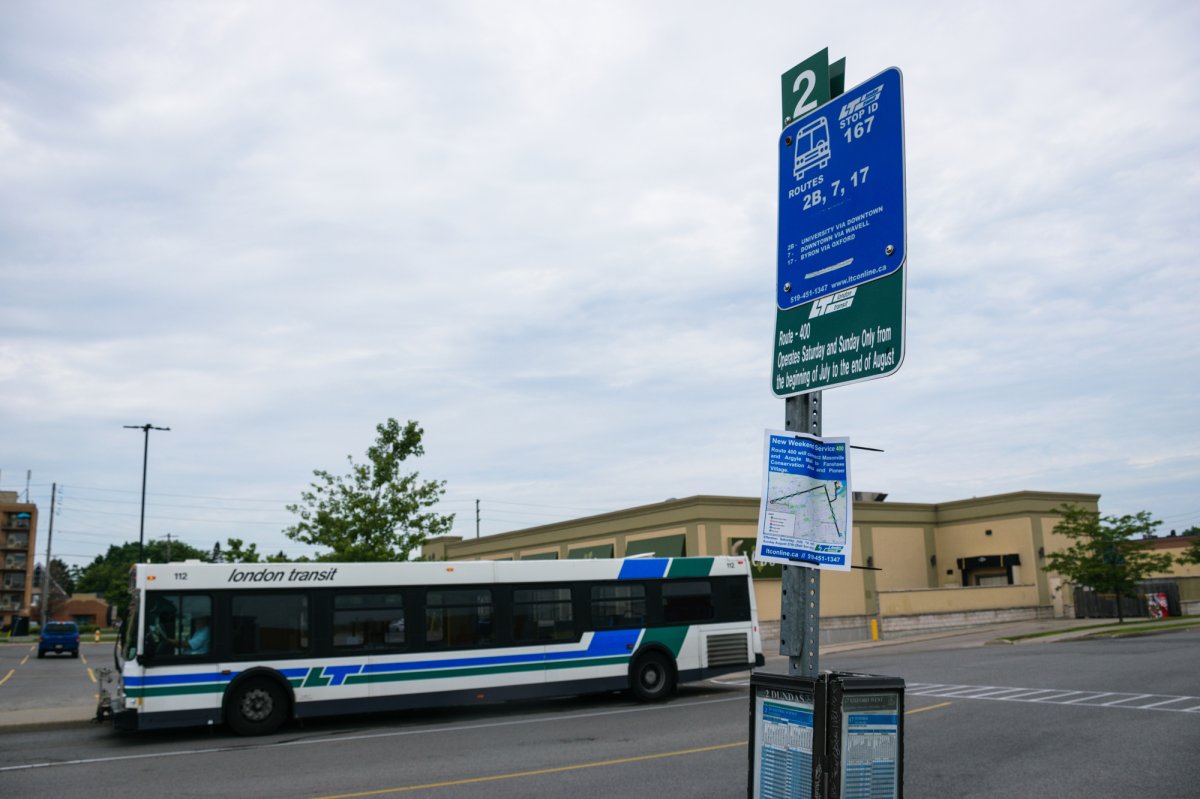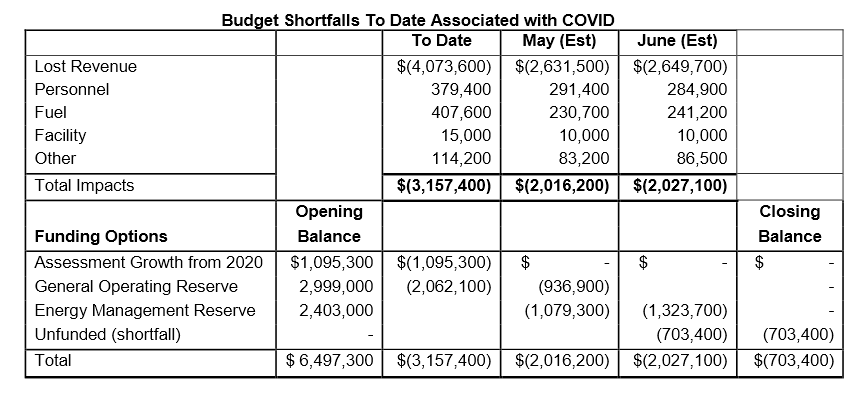With its emergency reserve funds set to be empty by the end of next month, London Transit commissioners voted Wednesday to notify the city that more municipal support may be needed to offset the growing financial impacts of COVID-19 should relief from upper levels of government fail to materialize.

The commission has already shed $3.15 million to date because of the health crisis, and is expected to lose another $2 million each by the end of May and the end of June, putting the commission in the red, transit officials say in a recent report.
The budget shortfalls are largely, if not entirely, due to lost revenue brought on by rear-door, free-fare boarding, something commissioners voted to extend until the end of June.
Commissioners also directed LTC staff to continue working with the province to identify next steps in safely returning to front-door boarding.
“The manner in which the report sets out the financial implications clearly demonstrates that we at LTC, within our budget control, have done everything that we can to partway through June,” said London Transit General Manager, Kelly Paleczny, in an interview with 980 CFPL’s Devon Peacock on Wednesday.
“That’s where we’re suggesting that once we get there, we’re going to need help from the city.
“It’s not like there’s no money left in the bank and things are going to have to close, it’s we need assistance in order for us to be able to balance our budget through to the end of the year.”
Paleczny was invited by London North Centre MP Peter Fragiskatos to address the Federal Finance Committee on Tuesday and address the need for help from senior levels of government in tackling the issue — one being felt by transit agencies across the country.
“We believe both senior levels of government need to come to the table and assess the burden that’s been created… it’s just something that municipalities can’t shoulder on their own,” she said.

Get weekly health news
London itself is facing a budget hole of as much as $33 million by the end of August due to lost revenues and other pandemic-related costs.
Last week, council voted to allocate the remainder of the city’s 2019 surplus — about $3.2 million— toward the pandemic.
City staff had directed agencies, boards, and commissions to do everything possible within their own budget control to manage any budget shortfalls caused by the pandemic.
Given the significant infrastructure dollars that have been doled out to public transit initiatives, Paleczny says it would be in the best interests of the province and Ottawa to provide relief.
“If they walk away from this and leave transit systems in a position where they’re looking at continuing to reduce service and/or increase fares — those are the things within our control that we can do to try and offset this budget — those investments in infrastructure, they’re not going to see the returns on investment they had hoped because the systems are going to fail.”
In offsetting the pandemic’s continued impacts, London Transit staff say the agency has already exhausted its $1.1 million in assessment growth funding for the year, and is expected to deplete both of its reserve funds — a combined $5.4 million, accumulated to fund budget shortfalls that are a one-time occurrence — by the end of June.
Even with the funds from the assessment growth pool and the two reserves, the commission is still expected to see a budget shortfall of $703,400 by the end of next month.
Without a new source of funding, questions remain over how London Transit will deal with potential ongoing pandemic-related costs — costs that, right now, are impossible to predict given the ever-changing situation.
Transit staff say the only way to address anticipated shortfalls within the budget would be to significantly reduce service levels on both conventional and specialized services, given raising fares isn’t an option.
A majority of conventional routes have already been running on a modified Saturday schedule during the week, with Saturdays seeing typical Sunday levels of service, and Sundays seeing Christmas Day levels of service, according to the commission.
Although ridership has fallen as much as 70 to 80 per cent from levels normally seen at this time of the year, the commission has shied away from more significant service cuts to avoid crippling and overcrowding the transit network that many Londoners still rely on, particularly as the province begins to reopen.
Transit ridership has risen slightly — about 10 per cent — since the province’s stage one reopening plans came into effect last week, according to LTC figures.
Paleczny stressed that, despite the grim financial picture, Londoners shouldn’t interpret the commission’s report to mean that the LTC’s doors will have to close halfway through June because of a lack of money.
But when asked about the unlikely possibility where no transit would be operating in the city, Paleczny replied, “certainly there could be a scenario. I mean, if the city says, ‘you know what? We have absolutely no money. There’s nothing more we can do because, here’s the priorities that the city has laid out.'”
The city, she noted, is in a similar situation to London Transit in that it is also unable to operate at a deficit, meaning things will have to be prioritised.
“But again, I do believe that the province and the federal government are paying attention to this request, and I do believe that we’re making progress,” she said.
“I certainly, strongly hope that there’s not a scenario where we’re not seeing transit, and certainly that’s not anything that administration would be recommending to the commission at this time.”















Comments